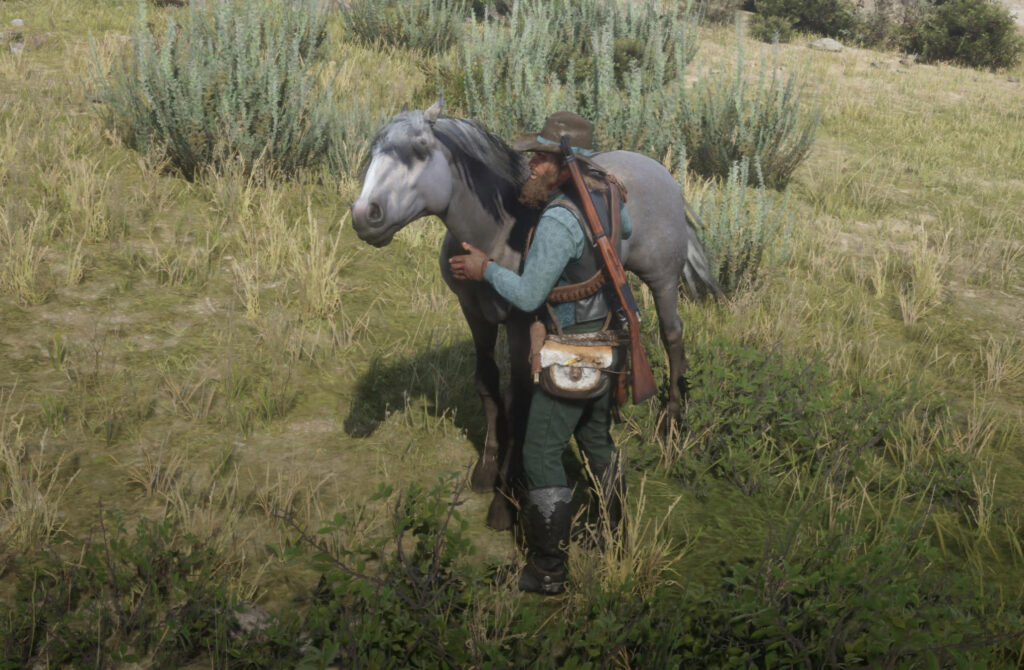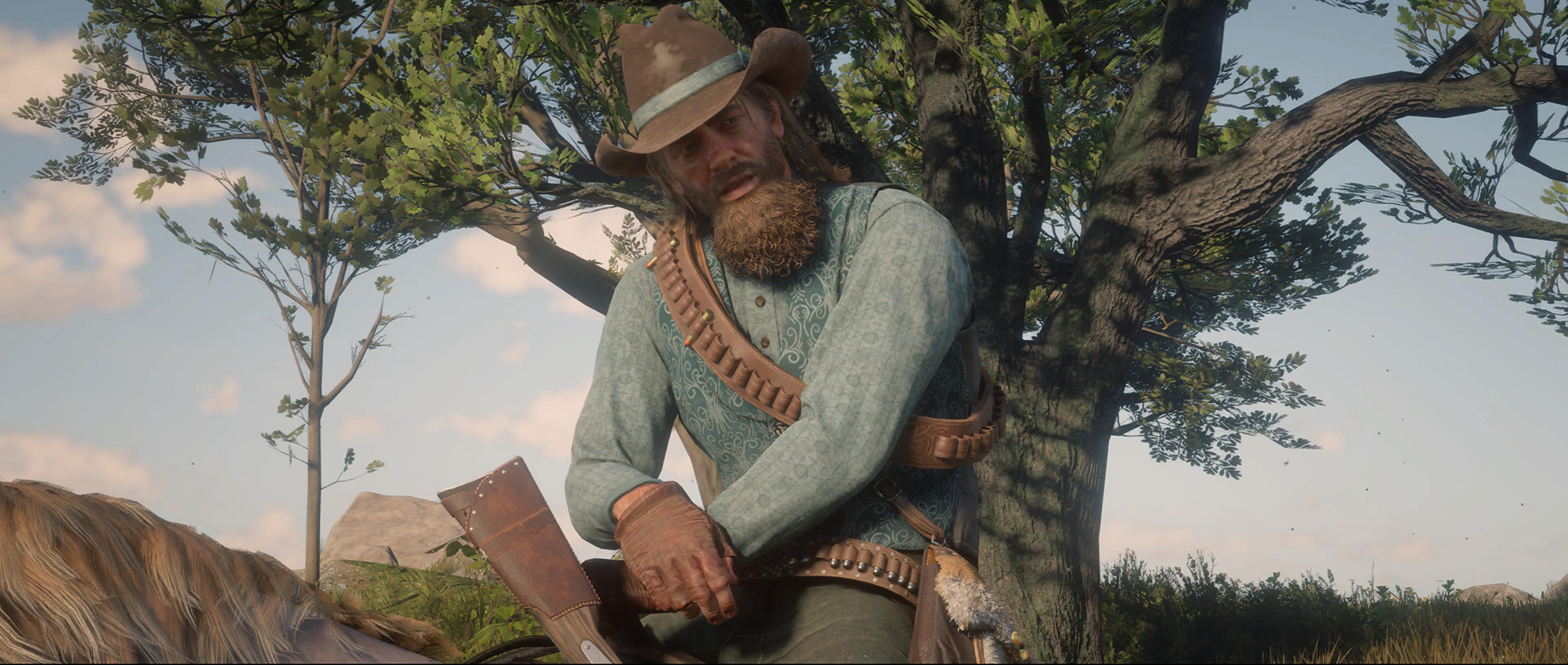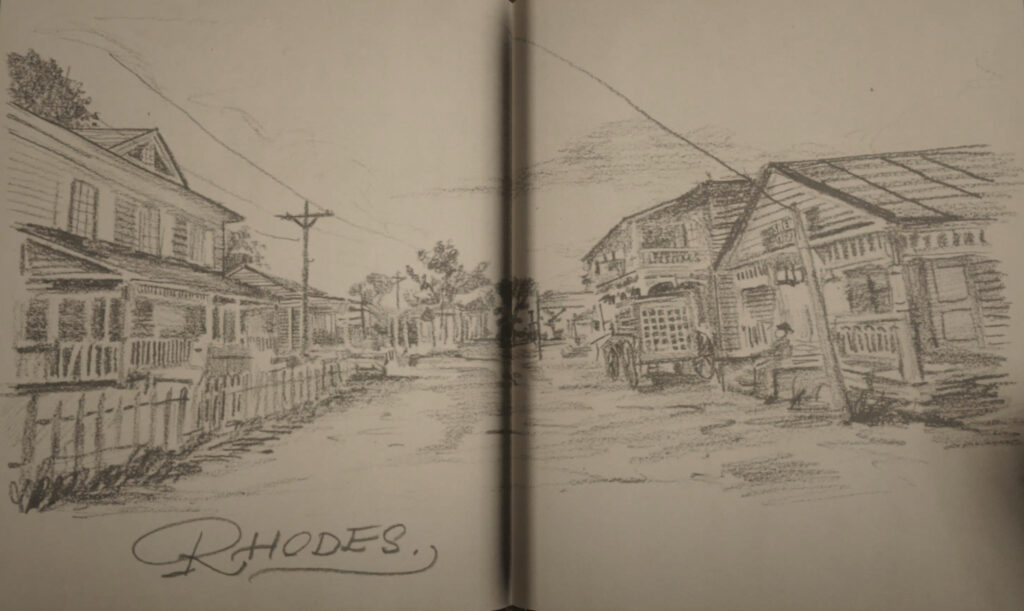The many layers of Arthur Morgan
I would like to express a massive SPOILER WARNING for this entire post. If you ever plan to play Red Dead Redemption 2 and would like to not have your enjoyment of it ruined, I urge you to NOT continue reading!
Just to put things into context, I would like to point out that I have not played Red Dead Redemption (1), and I only familiarized myself with the story of this game after I played Red Dead Redemption 2. If you know all the games, you will know that knowing certain things will change your perception of certain characters in Red Dead Redemption 2. I went in blind, and I think that’s the best thing to do, because Red Dead Redemption 2 is actually a prequel to Red Dead Redemption.
Arthur Morgan is the protagonist of the video game Red Dead Redemption 2, and probably the best video game character of all time – perhaps even one of the greatest fictional characters ever created. If you think that’s a bold statement, I would like to take a deep dive into this character’s history and psyche and present to you my arguments that have led me to this conclusion.
I have to admit that when I first started playing Red Dead Redemption 2, I found the whole idea of playing as Arthur a bit off-putting, much like the whole game. Chapter 1 was a tedious, somewhat annoying tutorial, in which you are overwhelmed by roughly ~20 NPCs talking at you the whole time, and to make things worse, there’s freakin’ annoying snow everywhere. The game only truly begins in Chapter 2, and I would say it has a learning curve of about 20 hours – after which, you will very, very slowly start to grow attached to Arthur and fall in love with this amazing, very much alive, open world. The game is deliberately paced very slowly, and the story only really gets going in Chapter 4 out of 6.
So what makes playing Arthur so off-putting early in the game? Well, he’s the muscle of the Van der Linde gang, an outlaw who robs, loots, and beats up people for money. If you watch the official second trailer for the game, you’ll probably think “jeez what a jerk!”, and the game looks like lots of brainless robbing and shooting. That is generally the vibe of the dreary Chapter 1 and a lot of missions in Chapters 2 and 3 as well – Dutch, Arthur’s boss and leader of the gang, calls all the shots and sends Arthur out to blow up trains, shoot up rival gangs, and collect money for the gang’s resident Austrian loan shark Strauss. As you do these things, you’ll probably start thinking to yourself “but I don’t want to be mean to this poor young family just trying to live their lives”… and if you pay very close attention to the game, neither does Arthur1. And this is where the complexity of this character begins.
Arthur was more or less born into the outlaw lifestyle. But this lifestyle is very much a dying lifestyle – it’s 1899, and the wild west is slowly being tamed. Dutch and his gang are constantly on the run, desperately clinging to a nostalgic notion of a bygone era and rejecting modernity. Deep down, Arthur is very much aware of what he is – a bad guy, an outlaw, a killer and a dying breed. However, he justifies his behavior with his belief in Dutch’s philosophy. Dutch, a very charismatic and cunning gang leader, has convinced his gang that he truly is just trying to make the world a better place. However, as time passes, Arthur begins to see through Dutch.
So being a good, honorable man deep down, how could Arthur have fallen for Dutch’s mirage in the first place? The answer to that is simple – he’s been groomed by Dutch. As mentioned before, Arthur has been part of the gang pretty much since he was a teenager, coming from an abusive family. Dutch took him in and treated him like a son – but never out of love for Arthur, only ever out of his own self-interest. Arthur became Dutch’s most-trusted man because he was groomed to be. As you continue to play the game, you will sooner or later realize that Dutch is very much a narcissist, who only cares about himself. Even very early in the game, during the idyllic and very relaxed Chapter 2, there was one moment in particular that really struck me, so much that I saved it as a video clip:
Even before that, Arthur shows a lot of tell-tale signs of someone who’s been abused by a narcissist, most notably his lack of self-worth and his feeling that he’s not good at anything. For one, that’s because on numerous occasions, Dutch and other gang members put him down for his skills. But that’s also just a very common effect of having been raised or groomed by a narcissist – everything always revolves around them, so there is no opportunity for you to develop a sense of self. Everything you do is to please them, and your own needs and boundaries are constantly disrespected. Having been in this situation, I can 100% relate to Arthur. Arthur is very skilled at many, many things, but he just puts himself down, all the time. Even during such trivial things as going fishing.
But there’s one, very obvious thing that you can do to get to know Arthur’s thoughts better: read his journal! I imagine that many players completely overlook Arthur’s journal, and just see it as a bunch of scribbles. But this is where you can really get under Arthur’s skin, and slowly learn that he’s actually not that happy with the things he does. One of the most notable journal entries is about working for Strauss, and only when reading his journal entries about these missions, do you really learn how much Arthur hates doing them. Another journal entry that really stuck with me, is the one about the photographer side mission. I posted this on my mastodon a while ago; he writes about his adventure of the photographer taking pictures of predators – and snarkily suggests that Dutch is a predator.
His journal also displays Arthur’s artistic side, and he’s actually not only a great writer, but also a very skilled artist. I went to art school, and drawing what Arthur draws, with that level of accuracy and with great perspective work, is much, much harder than he makes it look like. I couldn’t draw nearly as well as he does. If you don’t appreciate Arthur’s drawing skills yet, I promise you you will once John takes over – that man can’t draw, has horrible handwriting, and his journal entries are nowhere near as thoughtful as Arthur’s.
Arthur’s sensitive side always feels like such a stark contrast to John. I noticed this when I watched a video of John taming a horse (which I found rather off-putting), and only then did I start to really think about Arthur’s natural horsemanship2. Back in a day when “breaking” horses was still often taken quite literally, Arthur’s approach to horses shows a very deep understanding of horse psychology and communication. When taming a wild horse, he approaches the horse very calmly, very patiently, using his voice to sooth the horse. As soon as he gets close enough, he very gently pats the horse and sometimes says something nice like “See, we’re friends now” to the horse. This is a very gentle approach, which is barely ever portrayed like this in your typical cowboy media.
Outside of taming horses, Arthur is also always exceedingly patient and gentle with his horses. He never mistreats his horses, and even if they buck him off he never blames the horse. He usually pats his horse after mounting it. You as the player have the choice on how much Arthur sweet-talks his horses, and you can pat them, brush them and feed them. The way the horses react to Arthur is incredibly detailed. Very often, you can see tiny little ear flicks when Arthur talks to his horse, indicating that the horse pays attention to him and appreciates him.

Aside from horses, Arthur seems to be generally fond of animals, even though he can spend a significant amount hunting and killing them. When I played this game for the first time, I was definitely a bit torn about how big a role hunting plays in the game, and at how vile the skinning animations are. But it’s a big part of outlaw life and one of the main food sources for the gang. On my first playthrough I didn’t pay it much attention, but aside from just killing animals, you can actually also spend a significant amount of time just studying wildlife. The wildlife is one of the things that make this game feel to utterly alive. No matter where you go, you can always hear animals, look out for them, and see if you can find them when you follow the sound.
You can spend hours upon hours just standing on a hill and watching birds with your binoculars from a distance. This game is a dream come true for fans of birding. There are nearly 200 species of animals, birds and horses in this game to discover, and all of them have their own habitats and their own behaviors. If you shoot a deer and leave its carcass at a riverbed, there are good chances that sooner or later scavengers like boars or vultures will be attracted. And don’t get too close to mountain sheep, or else they might headbutt you. Arthur generally treats all animals in the game with respect. Whenever he studies an animal, he will make a cute little drawing in his journal. If he praises and pats dogs in the world, the dogs will recognize him and be happy to see him next time he comes around. And I can’t help but think that sometimes he feels sorry for killing animals, as sometimes it seems he apologizes to the animal (or possibly his horse) while skinning them.
This thought has been confirmed by Arthur’s little chats that he can have with Tilly, one of the gang’s members. Occasionally there’s an option to sit down and chat with her at the camp, and Arthur opens up to her about how he feels about the things he does – whether it be killing humans or animals, he expresses his remorse over his actions to her, his doubts about his lifestyle, and his fears of what the future holds for people like him. As the game progresses, Arthur’s journey to discover his true beliefs becomes more and more obvious, especially so once he is diagnosed with a terminal illness. While there have been hints early in the game, this diagnose comes very sudden to him, and it’s like being slapped in the face with your own mortality. As the last couple of Chapters progress, he becomes weaker and begins to question his actions more and more.
The portrayal of Arthur’s illness and its progression is very interesting, and seems to resonate a lot with people who are chronically ill. Arthur is not truthful with those around him about his condition and he pretends to be able to do things that he actually cannot do, as he is afraid of admitting the extent of his sickness to himself and others. He feels frustration when he realizes he can no longer do everyday tasks that were once very easy for him. He struggles to pace himself and pushes himself too hard, even though it will make him more ill. Due to his illness, he loses his status in the gang due to losing physical strength and ability, and subsequently loses a big part of his identity – he’s always been Dutch’s muscle, Dutch’s right-hand man, the strongest and most capable guy in the gang. Now that he is losing his strength and realizes that his life is about to come to an end, it all comes crashing down.
All these little seeds of doubt that have been sewn allover the game in Chapters 1-4 are now being cultivated into full grown trees. Arthur begins to question his life, his beliefs, and his own loyalty. He begins to see through Dutch and his manipulations as he witnesses Dutch killing a person he previously made a deal with.
“We’ve been on the run for months now… and I seen you… killing folk in cold blood… like you always told me not to.” — Arthur to Dutch
All of these events, combined with his advancing illness, is sending Arthur down a path of redemption. This is not sudden, but slow and difficult, as he struggles with his identity. Ultimately, he seeks redemption not for himself, but to secure a better future for those he cares about – namely John Marston, who would continue down his own path of redemption in the first game Red Dead Redemption. In the end, Arthur’s fierce loyalty to the gang, who he considered his family, drives him to protect John, Abigail and Jack at all costs.
Arthur’s loyalty ultimately led to his downfall, as it blinded him to Dutch’s descent into delusion and the harm it caused. The theme of loyalty runs deep in Arthur’s story and transforms him. Initially, he justified his actions by claiming they were necessary for the gang’s survival, even if it meant resorting to violence and intimidation. However, this mindset ultimately proved to be his undoing. As he began to question his own actions and those of the gang, he gradually underwent an arduous transformation. He struggled with doubt and wrestled with his conscience, ultimately coming to the conclusion that there must be a better way to help others, even if it meant sacrificing his own redemption. In the end, he found what he was looking for, proving that even the most flawed individuals can find redemption through self-reflection and growth.
“You been loyal, I been loyal. Look what that caused. You know, all that ever mattered to me was loyalty. It was all I knew. It was all I ever believed in… but not anymore John.” — Arthur to John
So who is Arthur Morgan? Beneath the rough exterior, there are so many layers to him. He’s a man born and raised into an impossible situation, groomed and used by others to do their bidding. In a different life, he might have been an artist or a scholar, as he is way more intelligent than he admits to himself. He has a wonderful personality, full of compassion, kindness and humor. He’s the sassiest, most sarcastic and most fun character, while also being the most emotionally complex character I ever encountered in a video game. He stands in shockingly stark contrast to John, who’s rather dry, dull and dumb in comparison, and honestly I never felt like I wanted to play as John once I had to say my goodbyes to Arthur3.
This game is utterly, utterly heart-breaking. It sells you an idyllic, peaceful open world in Chapters 2 and 3, and then starting in Chapter 4 it assaults you with emotional turmoil, numerous character deaths, and the inevitability of mortality, one gut-punching story mission after the other. By the time you start the final mission, aptly titled “Red Dead Redemption”, you pretty much know that this is it. It’s the end. There is no way for Arthur to come out of this unscathed, the poor man has been slowly dying for the past two Chapters anyway. This ending will hit you right in the feels, and it will take you weeks, possibly months to get over it. But having gone through all of this was absolutely worth it, and I would and will do it again4. Red Dead Redemption 2 is a true masterpiece, and Arthur Morgan is the greatest video game character of all time.



Write a response